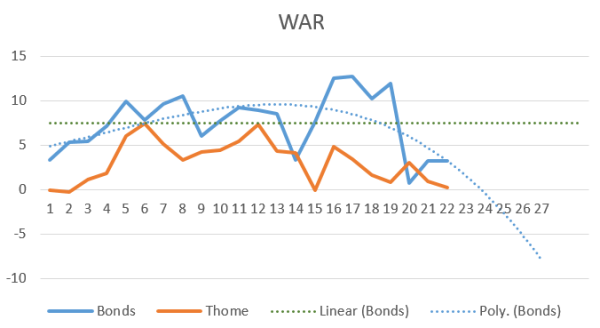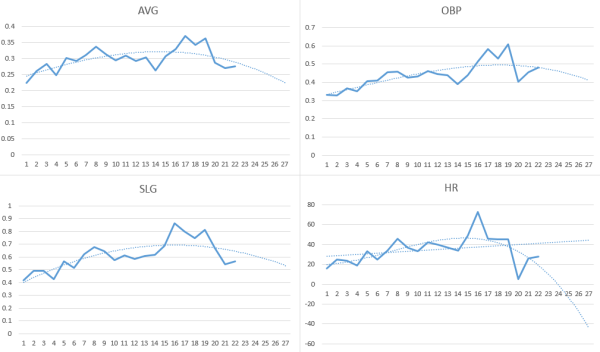This article was originally published by our good friends at Banished To The Pen. You can contact the author, Andrew Patrick, on Twitter.
Barry Bonds was not a human being. He was a Kryptonian alien sent from another planet to destroy all baseballs. Like Superman, he was amazing at so many things it seemed unfair. You can get lost in Bonds fun facts. As mentioned in a recent podcast on this very site, though, Barry Bonds was also not a great human being. Much like the Last Son of Krypton, his mission was to destroy and not to befriend. Bonds made a lot of enemies in his days in the majors. In his last season he finished with a slash line of .276/.480/.565 with 28 home runs as a left fielder. It seems ludicrous that his career ended when he was so productive; lawsuit worthy, even. It’s apparent that Bonds’ off-field issues and clubhouse presence were deemed too destructive for benefit, and his career was cut short.
Not all careers end like this, though. Let’s take, say, Gentleman Jim Thome. Thome was well regarded throughout the league for being a swell dude. He finished his career with a line of .252/.344/.442 with eight home runs as a platoon DH. While Thome was still productive, not many teams can afford the luxury of a guy who can’t play the field or hit lefties, and with Thome’s fWAR at 0.2, it was an understandable end to his career. Thome’s 2007 season was a 3.4 fWAR season, which dropped to 0.8 in 2009, before climbing back up to 3.0 in 2010. It ended in 2012. Jim Thome, as a good guy and a great clubhouse presence, was deemed valuable until the day he couldn’t produce on the field anymore.
What if Bonds had that same leash? What if people thought Barry Bonds was a great guy, and continued to employ him until he was bad? What would his career have looked like? I’m going to play around a bit with projections and trendlines and see if I can’t come to an answer. Let’s take a quick look at their career WAR graphs, plotted by season.
Bonds’ career arc is so fascinating. He takes this giant spike in the second half of his career that people aren’t supposed to have (hilariously dubbed the LOL zone by Justin Bopp over at Beyond the Box Score). If we tried to give him a linear trend, he never gets bad. In this alternative universe, Bonds is so highly regarded, that he takes another spike to 10 WAR around the age of 36. He has apparently become a 15th level Monk and no longer feels the effects of aging. His career ends only when he finally reaches the age of 100 and simply keels over and dies one day while facing Vladimir Guerrero the 4th on the mound, a good curveball buckling him to the point of death. He finishes his career with 800 WAR and 3,700 home runs.
I guess we can’t use linear trendlines for this, then. We’re going to have to switch to Polynomial trendlines. These are helpful for when a graph has hills and valleys that can’t be given a linear trend. This graph has two hills and valleys (early career and the LOL zone), so Polynomial 3 gives us a decent approximation of when Bonds’ career might actually end. In this case, he plays three more seasons, ending his career at the ripe age of 46, in 2010. He fails to beat out Julio Franco for oldest position player, though one could write another article about him having the reputation of Thome plus the spunk of Franco, and in that case he might survive another three to four years as a fill-in player. I don’t think that would happen though, even for Bonds. Let’s take a look at the third order Polynomial graphs for some of his other stats.
So here we see Bonds’ slash line remaining relatively consistent, but his home run power completely drops off the table. We already know that by the time he hung them up in the real universe, he was unable to play the field. It’s safe to assume, then, that he plays out his career in the Thome path, becoming more of a platoon DH until his body gives out. Here’s how the twilight of Nice Guy Bonds might have looked, as inspired by August Fagerstrom’s theoretical account of Mike Trout becoming the career WAR leader.
2008: After playing admirably in 2007, the Giants faced a very awkward decision. Their universally beloved left fielder continued to face problems with his knees, and tearfully informed the Giants that he was unable to play left field anymore. The Giants knew this already, but they didn’t want to part ways with the face of the franchise. They elected not to sign him to a contract in 2008, and Bonds sought offers as a DH. With the looming prospect of Jose Vidro as their DH, and coming off a surprising 88-win season in 2007, the Mariners came on strong, and signed Bonds to a 1-year, $10 million deal to play as the Mariners’ new designated hitter. Bonds excelled in the role. Appearing in 140 games, he put up a slash line of .260/.440/.520 with 18 home runs. The Mariners, unfortunately, foundered despite the improvement, to a 65-win finish, last in the AL West. With a poor outlook on the future, Bonds was given the opportunity to test the free market again.
2009: After a fierce bidding war, Bonds was finally signed north of the border by the Toronto Blue Jays. Much like the Mariners, the Jays were coming off an 86-win season in an extremely competitive AL East that saw the Rays and Red Sox battle it out in the ALCS. To add some thump in the lineup, the Jays signed Bonds as their DH, leaving Kevin Millar as a utilityman. Bonds started off well, but his power began to wane even further, and he struggled against southpaws. While his overall line was a very solid .255/.418/.490, he played in just 95 games, hitting the 15-day DL for his knees and a lingering foot injury. When he came back, the emergence of Adam Lind crowded his spot, as Lyle Overbay left him without much of a spot. Overall, he accumulated 250 plate appearances for the Jays, with 11 home runs. The Jays disappointed, despite their offense, to a 75-win season. With Overbay and Lind in the fold, Bonds was deemed expendable, and was once again without a team.
2010: Many rumors circulated as to the impending retirement of Bonds, who announced this would be his last season. Having played for disappointing teams his last two seasons with bad knees, his interest in the game was beginning to wane. He was so widely well regarded, some wondered if he would be named a player-manager. In the end, it was the Chicago White Sox who won the bidding for Bonds, with a 1-year, $3.5 million deal. With Paul Konerko and Bonds in the fold, the team had a power hitter against both sides, and the two formed a strong friendship throughout the season. Even as Bonds’ production withered, those around the team raved about his leadership skills, as Gordon Beckham, under the tutelage of Bonds, broke out and became a force in the middle of the infield. Bonds was given the star treatment throughout the league, with each team showering him with gifts for all the good he’d done. With the sport still reeling from the Mitchell Report and the steroids scandal, Bonds was held up as a triumph, never even being whispered about as a cheater. Bonds finished with 202 plate appearances and a slash line of .240/.361/.462, his home run power now completely sapped into doubles. He finished with just three on the season, the final coming in a late September game against the A’s with Trevor Cahill on the mound. The stadium was nearly filled to the brim with Giants fans wishing to see Barry just one last time, and Bonds ripped a long home run off the foul pole, and was given a long curtain call afterwards, his eyes wet with joy. Bonds rode off into the sunset, and was given the first ever unanimous Hall of Fame entry. His career 794 home runs will probably never be topped.
Thank you for reading
This is a free article. If you enjoyed it, consider subscribing to Baseball Prospectus. Subscriptions support ongoing public baseball research and analysis in an increasingly proprietary environment.
Subscribe now

The engineer notes that increasing the diameter of the milking tubes would allow for a greater flow, and suggests packing the cows more tightly, allowing them to accommodate more cows without more buildings.
And then the physicist is called on. He walks to the chalkboard and draws a circle. "Imagine the cow is a sphere."
If it blows up, it's chemistry.
If it turns green and dies, it's biology.
And if it just doesn't work, it's physics.